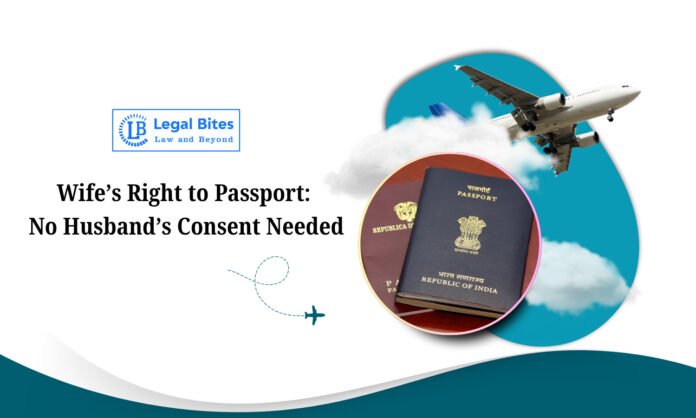[ad_1]
In a landmark judgment, Madras High Court, in J. Revathy v. Union of India & Ors. [W.P. No. 21709 of 2025] unequivocally held that a married woman does not require her husband’s permission or signature to apply for or obtain a passport. This significant ruling reaffirms a woman’s autonomy and challenges patriarchal practices within administrative systems.
Background of the Case
The petitioner, J. Revathy, had applied for a fresh passport from the Regional Passport Office in Chennai. However, the application was halted because her husband’s signature on Form-J was mandatory, citing a pending matrimonial dispute (HMOP No. 289 of 2025). Her husband had filed a case for dissolution of marriage before the Sub Court, Alandur. Faced with bureaucratic insistence despite a strained marital relationship, Revathy approached the Madras High Court seeking a writ of mandamus.
Issue
- Whether a married woman in India require her husband’s permission or signature for processing her passport application?
Arguments and Observations
Petitioner’s Case
- Married in 2023 with a daughter born in 2024.
- Undergoing a legal separation from her husband.
- Her application for a passport was rejected for want of the husband’s signature.
Respondents’ Position
- The passport office relied on procedural insistence that, in cases involving matrimonial disputes, spousal consent (Form-J) is necessary.
- No criminal case was pending against the petitioner, as clarified by the police.
High Court’s Analysis and Observations
Justice N. Anand Venkatesh, while deciding the case, made strong and progressive remarks upholding the legal autonomy of women, especially within the institution of marriage. The following are key takeaways from his reasoning:
1. No Legal Requirement for Husband’s Signature
The Court made it clear that there is no provision in Indian law which requires a married woman to obtain her husband’s permission or signature while applying for a passport. The requirement imposed by the passport authorities in this case was therefore unjustified and lacked any legal basis. A woman, simply by virtue of being married, does not become dependent on her husband for such personal and official matters.
2. Critique of Patriarchal Bureaucratic Practice
The judge expressed concern over the prevailing bureaucratic mindset that assumes a woman’s autonomy must be governed by her marital status. The insistence on a husband’s signature was viewed as an example of a regressive and patriarchal attitude that reduces married women to subordinate roles in administrative processes. Such practices were criticised as reflective of male-dominated social norms that are incompatible with constitutional values.
3. Assertion of Individual Legal Identity
The judgment reinforced the view that marriage does not diminish a woman’s legal identity or individuality. The Court emphasised that a married woman retains all her civil and legal rights, including the right to apply for a passport on her own. Treating women as dependent on their spouses for administrative approval is a violation of their personal liberty and dignity.
In essence, the judgment promotes the idea that women must be treated as full and equal citizens, capable of making decisions independently, without being subjected to gender-based procedural hurdles.
Final Direction
The High Court issued the following directive:
- The Regional Passport Office (respondent no. 2) was ordered to process the petitioner’s application independently of her husband’s signature.
- The passport must be issued if other statutory requirements are satisfied.
- The process must be completed within four weeks from the date of receiving the order.
The writ petition was accordingly disposed of, with no order as to costs.
Key Highlights of the Judgment
Justice N. Anand Venkatesh stated:
“In the considered view of this Court, the application submitted by the petitioner seeking for passport has to be processed independently. It is not necessary for a wife to get the permission of her husband and take his signature before applying for a passport before the authority. This insistence made by the 2nd respondent shows the mindset of the society in treating woman who are married as if they are chattel belonging to the husband.
The practice of insisting for permission from the husband to apply for passport, does not augur well for a society which is moving towards woman emancipation. This practise is nothing short of male supremacism.”
Legal and Constitutional Significance
1. Article 14 – Right to Equality
The ruling enforces the principle that married women are entitled to equal treatment and cannot be subjected to discriminatory procedures that reduce their legal identity to that of a dependent spouse.
2. Article 21 – Right to Life and Personal Liberty
The insistence on spousal approval violates a woman’s right to dignity and autonomy, central to Article 21.
3. Passport Act, 1967 and Passport Rules, 1980
There is no statutory requirement for spousal consent in the Passport Act or Rules for issuing passports to married individuals. The court’s ruling reinforces this statutory position.
Impact and Precedent
This ruling adds to the growing jurisprudence upholding women’s rights in matters of identity, travel, and autonomy. It also sends a clear message to administrative authorities to:
- Abandon outdated practices.
- Adhere strictly to the law, not societal assumptions or informal procedures.
- Recognise individual rights irrespective of marital status.
Conclusion
The Madras High Court’s decision in J. Revathy v. Union of India & Ors. sets a crucial precedent: a woman’s legal rights do not depend on her marital status. By eliminating unnecessary spousal control over personal documentation, the judgment strengthens women’s autonomy, dignity, and access to public services.
This ruling should prompt other authorities to review and revise any such practices that violate the spirit of equality enshrined in the Constitution. The judgment reaffirms that no woman in India is a second-class citizen, and her legal identity stands independent, strong and equal.
[ad_2]
Source link

